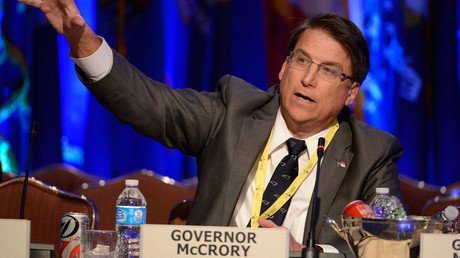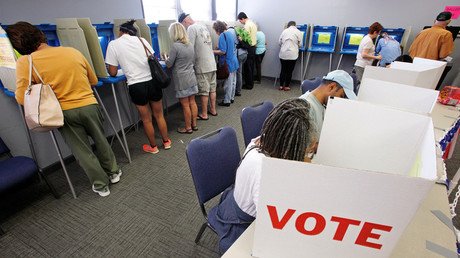N Carolina Republicans strip power from incoming Dem governor after days of protest, arrests
The Republican-led North Carolina legislature has passed special session measures that will weaken powers vested in the state governor, an office the Democratic Party won in a close election this fall.
Demonstrators gathered at the state legislative building again on Friday to resume protests of hastened efforts by North Carolina's Republican legislators that would sap various powers from incoming governor Roy Cooper, a Democrat who was previously the state's attorney general. In a close election, Cooper defeated Republican incumbent Pat McCrory last month and will be sworn into office on January 7.
RIGHT NOW: Police making first arrests after protestors ignore orders to settle down at @NCLeg. Chants getting louder. @ABC11_WTVD#ncpolpic.twitter.com/FgqMoBJEGM
— Jonah Kaplan (@KaplanABC11) December 16, 2016
Yet the demonstrations did not stop the Republican majority, which two bills that seek to shift certain powers from the governor's office to the Republican-dominated legislature or Republican-held state positions. McCrory signed Senate Bill 4 shortly after passage. The other bill awaits approval from McCrory, according to the News & Observer.
Want to know what's happening in North Carolina? Here's a list of the powers being stripped from the newly elected governor pic.twitter.com/TH21i9hqCr
— Dan (@bookowl) December 16, 2016
The bills' provisions include: a requirement of state Senate confirmation of the governor's cabinet appointments; alterations to the governor's ability to choose trustees for the University of North Carolina system; reduction of the governor's power to appoint members of the state elections board; a vast cut to the number of state employees the governor can directly hire and fire; and a transfer of oversight authority of state public schools to the state schools superintendent, currently a Republican.
Getting louder, "Shame!" #ncga#ncpolpic.twitter.com/1KDMXScoqL
— MarySwannParry (@MarySwannParry) December 16, 2016
Demonstrators crowded the House gallery on Friday as elected Democrats in the chamber warned of overreach by the GOP. Republican efforts in the legislature's special session are "a blatant political move by a party that must be afraid of voters so they hang on to what power they have," Democratic Rep. Graig Meyer said to cheers from the crowd.
Let us in! This is the People's House! #RespectOurVote#ncga#ncpolpic.twitter.com/IqQmzsaslD
— NC NAACP (@ncnaacp) December 16, 2016
At least 18 people have been arrested Friday, according to the News & Observer.
On Thursday, North Carolina lawmakers began debate on the measures. Around 300 people, according to reports, gathered inside the state legislative building in Raleigh to oppose the efforts. At least 20 people were arrested on Thursday night, the News & Observer reported.
Kayla Cox of NCNAACP just arrested!!! This is not Democracy! pic.twitter.com/Q4yg3fS3o3
— NC NAACP (@ncnaacp) December 16, 2016
In a statement released Friday, the North Carolina Republican Party's chairman, Robin Hayes, called protesters "a small mob" that is attempting "to stop the duly elected representatives form debating critical issues."
.@NCGOP issues statement calling #ncga protesters a "small mob." #ncpolpic.twitter.com/TEHLWfkQdm
— Colin Campbell (@RaleighReporter) December 16, 2016
Governor-elect Cooper said Thursday that he would consider suing the Legislature if he considers unconstitutional any legislation that is passed and signed by McCrory.
"Most people might think that this is a partisan power grab, but it is really more ominous," Cooper said at a news conference on Thursday, according to Reuters. "This is about thwarting the governor's ability to move us forward on education and healthcare and clean air and water."
Cooper said the secretive, last-minute efforts to hamper the governor's abilities before Republican McCrory leaves office is an inappropriate way to govern.
Remember when Democrats donated money to the North Carolina GOP after that fire?https://t.co/tDbX17JgPp
— Jeff (@jamfan40) December 16, 2016
"Major changes in the way state government operates should be done deliberately, with input from all parties, particularly something as important as elections and making sure people have the opportunity to vote," Cooper said, according to the News & Observer. "They shouldn’t be pushed through in the dark of night."
As Obama delivers a press conference blaming Russia for destroying our democracy: https://t.co/G69UDw9eRX
— Anya Parampil (@anyaparampil) December 16, 2016
Republicans said the measures are predicated on offering more power to legislators, who they say are more accountable to voters than the governor.
"Our legislators are the closest state officials to the electorate. I think anything we can do to balance the scales back in that direction is a good move,"said Republican Rep. Jeff Collins.
During debate on Thursday, Republican Rep. David Lewis, a sponsor of the House bill, called his legislation "a good step forward in reasserting legislative authority vested by the constitution and entrusted to the members of this body."














